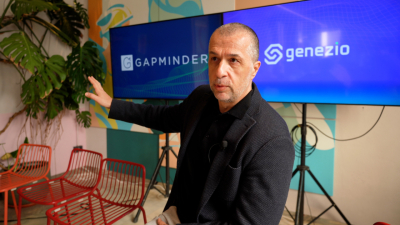In 1994-2001, Blodget worked for Prudential Securities, Oppenheimer&Co., and Merrill Lynch. He was designated as the most important Wall Street analyst in the online and e-commerce segment by Institutional Investor and Greenwhich Associates.
He was born in New York and graduated from the University of Yale.
Blodget holds stocks in companies such as Yahoo, eBay, Baidu, Amazon, Spark Networks, Microsoft, Merrill Lynch, Gartner Group, Time Warner. He also provides consulting services for companies like Schmap Ltd. (Hong Kong), PopRule, and Turtlejob (UK).
Wall-Street: How did the first half of 2010 look for online media? What trends can be noticed?
Henry Blodget:
There has been a strong rebound in display advertising since last summer, after the economy began to recover. Growth has been steady since then. Not explosive, but steady.
Wall-Street: Can we talk about a worse environment for online advertising in comparison with the same period of 2009? How do you comment?
Henry Blodget:
The two years after the dotcom crash in 2000 were actually worse. Then, the online advertising industry shrank by a staggering 25% and many companies went out of business. Last year, online advertising spending was down a few percent, but nothing like it was in 2001-2002. Spending should increase again this year.
Wall-Street: In Romania the print industry was heavily affected by the downturn, many publishers being forced to close down a number of publications or to move the content in online. How do you see this transition from print to online? Is it a rescue boat or a danger for the brand?
Henry Blodget:
It's the same story here in the US. Newspapers and magazines have been clobbered. Many have had to shut down or become "web-only." The problem with "web-only" is that it is a very different business. Newspapers focus on creating one paper a day that is delivered in the morning. Successful news web sites focus on creating content throughout the day. It's a different job, and it is hard for newspapers to be great at both (just as it would be hard for a web-online site to publish a great newspaper) Web-only
sites also generate much less revenue, and most newspapers can't survive on it.
I think some big newspapers will survive--the Wall Street Journal, the New York Times--but they will have to radically cut the size of their newsrooms.
Wall-Street: If it wasn’t for the financial crisis would we be talking so much about “the power and advantages of online?
Henry Blodget:
Yes, I think we would still be talking about the power and advantages of online. The transition from print would have happened eventually. Young people today don't read newspapers--they go online. The idea of paying lots of money to subscribe to a pile of paper seems crazy to them. What really has hurt newspapers over the past two years is that the advertisers have suddenly started switching to online. And that has forced many newspapers to cut back.
Wall-Street: What is your opinion regarding introducing taxes for online content?
Henry Blodget:
I think it's an awful idea. It makes me embarrassed for America. It's an idea created by powerful newspaper people who are whining to their powerful friends in government. The politicians say, "Oh, no! If I don't save this newspaper, there will be no one to write about me and get me re-elected!" So they propose crazy ideas like this. If this tax is enacted it will simply protect rich people who own newspapers, and it will hurt thousands of web sites who are now building the next kind of journalism.
Wall-Street: Do you take into account such a measure?
Henry Blodget:
I hope everyone realizes what a pathetic and crazy idea it is. I think eventually they will.
Wall-Street: Will the introduction of taxes for online content help the industry?
Henry Blodget:
No. Putting taxes on online content would simply help the newspaper industry, not the online industry. These taxes would hurt the online industry, which is now growing rapidly and creating lots of jobs. It is
simply an idea designed to protect an old industry that has been too rich for too long.
Wall-Street: Is the online industry ready for such a step? If not now, in how
many years?
Henry Blodget:
Never. If newspapers can't support themselves without tax benefits, they should be allowed to die.
Wall-Street: How did you benefit from the present economical context? What turnover did you have in 2009 and 2008? What about the earnings from online advertising?
Henry Blodget:
Like everyone else, we had a challenging year last year, but we still grew 3X over 2008. We will double again this year. Our business is basically break-even.
Wall-Street: 3 pieces of advice for the online publishers.
Henry Blodget:
The online news and information business is a different business than newspapers, magazines, or TV. To be successful requires a different kind of content. Don't try to do the same kind of content as a newspaper, or you will fail.
To succeed, you need to build community. You need to have thousands of people come to your site many times a day to see what is happening. Good content alone is not enough.
It is a very hard business--very competitive, low margin. To succeed, you need to be very big, or you need to have a revenue stream in addition to advertising (like subscr'+'iptions).
Wall-Street: 3 misconceptions about online media.
Henry Blodget:
It is a very different business than traditional media. You can't succeed by doing the same things newspapers, magazines, and TV do.
Citeste si:
Calculator Salariu: Află câți bani primești în mână în funcție de salariul brut »
Te-ar putea interesa și:



















































































![HR [PLAY] Tech Workout - 11...](https://www.wall-street.ro/image_thumbs/thumbs/973/973fe0a3888d417feff63de42e814180-260x260-00-65.jpg?v=1713554065)









